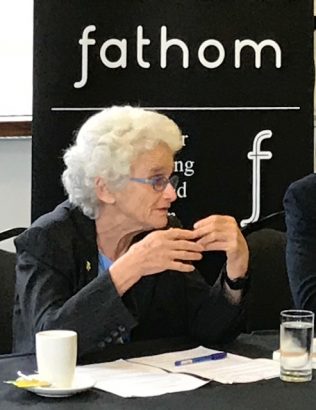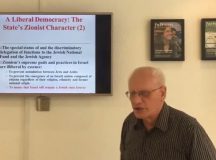Ruth Gavison is Professor Emerita of Human Rights at the Hebrew University of Jerusalem and an Israel Prize winner. In 2013 she was commissioned by then Minister of Justice Tzipi Livni to report on the constitutional anchoring of Israel as a Jewish and democratic state. In early September, Fathom and Regent’s University held a private round table with Professor Gavison to discuss the controversial 2018 Nation-State Law and its implications for democratic governance in Israel. She argues that ‘the politicisation and polarisation of Israel is extremely dangerous because it destroys the three circles of solidarity that Israel and the Jewish people need – solidarity of the demos of Israel, of the Jews in Israel and of the diaspora; each built over time, easy to ruin, and extremely difficult, if not impossible to rebuild’. Download a PDF version here.
Introduction
In the early 1950s Israel debated whether it should have a formal, supreme and entrenched constitution, but there was such a controversy over the preamble and some other issues, and such a fear of a ‘culture war,’ that a compromise was reached: No constitution would be adopted then. Instead, a series of ‘Basic Laws’ would be enacted which could later be combined to create a constitution. In fact, the Basic Laws were very slow to come and for a time they only covered the powers of the government and parliament. The courts interpreted them as being regular laws in all senses, but it did exercise judicial review over Knesset laws when entrenched sections of basic laws were altered without the required special majority. Only some very specific sections of basic laws were in fact entrenched (e.g. the section determining that elections in Israel are equal). In 1992, after an initiative to create a constitution failed, two more Basic Laws were passed by the Knesset, relating to human rights, including ‘Basic Law: Human Dignity and Liberty’. In what subsequently became known as a ‘constitutional revolution,’ the Supreme Court interpreted these two Basic Laws as giving it the power of judicial review over Knesset laws, which it previously didn’t have. The Supreme Court interpreted the ‘Basic Law: Human Dignity and Liberty’ itself as amounting to an Israeli Bill of Rights entrenching the concept of dignity, from which a constitutional right to equality that the Knesset deliberately did not include in the list of rights included in the law.
Many on the Right saw this constitutional revolution as illegitimate and sought to halt and reverse it. They argued that the constitutional revolution had changed the balance of Israel’s self-understanding between the three basic elements of Israel’s vision: ’Jewish,’ ‘democratic,’ and ‘committed to human rights’ by granting the first a very narrow interpretation, and expanding the other two – democracy and human rights. First, they tried to push for a more balanced whole constitution, alongside similar efforts by more liberal elements in Israeli society. When these failed in the early 2010s they started to advocate the idea of a creating a new basic law to secure the idea of Israel as the nation state of the Jewish people.
The origins of the Nation-State Law
So in 2013, during the second Netanyahu government, Justice Minister Tzipi Livni appointed me to lead a commission charged with thinking through the idea of a nation-state law and coming up with recommendations. Livni originally wanted the text of a basic law that would be a preamble to an as yet non-existent constitution. The intention was to maintain the balance between the three elements enshrined in the Declaration of Independence: Jewish self-determination, democracy and human rights – including civil and political equality. Had that law been enacted, it wouldn’t have been called ‘Basic Law: Nation State for the Jewish People,’ but instead ‘Basic Law: The Vision of Israel,’ or ‘Basic Law: The State of Israel’. It would have included, more or less, what is written in Article One of the 2018 Nation-State Law but it would also have articulated the principles of democracy and human rights that are enshrined in the Declaration of Independence. It would simply have declared that this is the vision of the state. In fact, in most of the proposed constitutions debated in Israel throughout its history, the preamble was supposed to include most of the present Nation-State Law, plus a variety of sections dealing with democracy and human rights.
The Nation-State Law, passed in 2018, only deals with the element of Jewish self-determination in the vision of the state. About that it provides a lot of detail (most of which, by the way, is already enacted in other laws and practices in Israel, but which had not hitherto been included in a basic law.)
Back in 2014 I recommended that the Knesset not legislate at all. I had concluded that it was unwise and unnecessary to try to make the vision enshrined in the Declaration of Independence legally binding. I did not think it was the best way to address the fierce debate in the country about what the state’s vision should be, and about who should decide on it – the political leadership with its disparate parties, or the courts with their language of human rights, democracy and universal ideals. I still think that was the correct approach. Rather than legislating, the proposed vision should have been advanced through education in civil society. The founding fathers said as much when they decided in 1950 not to have a constitution. More: a national vision is supposed to unite, not divide, so some ambiguity is needed in a constitutional text.
But if you are going to constitutionalise a vision of the State of Israel (which, as I say, I’m against) then the least you can do is to constitutionalise the complete vision – not just the commitment to Jewish self-determination but also the commitment to human rights and the commitment to democracy. The recently passed Nation-State Law went in another direction. It decided not to accept my thinking on two levels: it is detailed on everything that is Jewish, and it is almost totally silent on everything else.
After the Nation-State Law was passed, there was a very polarising debate in Israel. Arab citizens argued that the law made them second-class. The advocates said the claim was manipulative because there is nothing in the law that was not a part of Israel’s vision from the start. Druze insisted that they wanted equality but conceded that Israel was the nation-state of Jews. Other Arab leaders did in fact challenge the very legitimacy of the Jewishness of the state as even a component of the vision among others. Most Jewish members of the opposition supported the claim of the Druze, but disassociated themselves from that of the Arabs. So it is not easy to say what the impact of the law is, and how it should be regarded. Is it of substance or just symbolic? And if the latter, how should individuals and groups approach it and treat it?
It is significant that both ‘sides’ describe the law as simultaneously very significant and only symbolic! The government argues that the law is both a significant achievement and merely declaratory, changing nothing for the minorities. On the Arab side, the law is said to make them second-class citizens and merely confirm what they’ve known since 1948 – that Israel is a colonial state and that its Jewish and democratic components cannot coexist. According to them, Israel must choose. The choice to reaffirm Jewish self-determination in this way is clearly anti-democratic.
The politics of the Nation-State Law
When I was commissioned in 2013 to lead the commission examining the idea of a Nation-State Law, Prime Minister Benjamin Netanyahu cooperated with Livni in order to keep his own base quiet. The 2015 elections were, in fact, declared in part – at least allegedly – because of the government’s inability to reach agreement on the law. I was under the impression that Netanyahu planned to either remove the bill or to advance the Likud MK Benny Begin proposal which was my second-best option, a basic law that included all three elements: Jewishness, democracy and human rights. However, the elections led to the creation of a right-wing, religious government which did advance the law and reached an agreement on it.
In 2018, while passing the law was certainly an important political interest of the prime minister, it also reflected some deeper feelings on the broad right-wing of Israeli society. They are convinced that there has been a steady erosion of the legitimacy of Israel as a Jewish state, both inside and out of Israel, and that the erosion is in part the doing of Israeli elites in the judiciary, the media and the academy. They think there is a need for Israel’s status as a Jewish state to be re-affirmed and constitutionalised. There is indeed a dynamic in the legitimacy of the Jewishness of the state both vis-à-vis non- Jews, especially Palestinians, and vis-à-vis the internal Jewish debate on whether Jewishness is national or religious, and how it relates to civic and universal values. However, the balance between all these different commitments of Israel and its society has been changing in all directions. This is natural and inevitable when the demography and the geopolitical circumstances change. Israel does need a majority that affirms the right of Jews to national self-determination and it has it. In fact, it may be the Israeli Right who is undermining this majority by the rejection of any version of the two-state solution. In any event, entrenching just one component of a complex vision is clearly not the remedy for the deep politicisation and divisiveness that now afflicts Israeli society.
Politicisation and polarisation are global phenomena
If the Israeli political community is increasingly politicised and polarised, one part often uncomprehending of the other, we are hardly alone in that. When I talk to my friends in the US, most in the anti-Trump camp, I find an astonishing blindness to the real concerns of a very large number of their fellow citizens. The UK’s EU Referendum result was also, at least in part, the result of very deep divisions in society and much anger. In all three societies there is politicisation and polarisation.
For example, why is it so important for this government to communicate to non-Orthodox Jews abroad that they are not so welcome in Israel, or more specifically, not welcome to pray their way at the Western Wall? Where is the understanding that the Jewish people are diverse and so there is a need for a tolerant and inclusive framework? Today, the politicisation of Israel is extremely dangerous because it destroys the deeper circles of solidarity we need. Those solidarities were built over time. I fear they are easy to ruin but extremely difficult, if not impossible, to rebuild.
The Nation-State Law and the hyper-politicisation of Israeli society
The Nation-State Law is dividing the people of Israel. The Druze are willing to live with Jewish self-determination, but they want equality. The Arabs don’t want Jewish self-determination in the state at all. The Zionist Left is not against the Jewish state per se, but insists that any declaratory vision of the state should include all three elements of the Declaration of Independence. There is a complex reality in Israel and political rhetoric can’t easily cope with it. There are different visions and identities and their coexistence requires political management. And there are tensions between democracy, human rights and Judaism. By overriding all that complexity and all those tensions with quasi-constitutional laws we are dangerously narrowing the debate to ‘are you for or against the law’? We need to keep alive the difficult but essential national conversation about our visions of the state, and the new law does risks shutting that debate down.
The Nation-State Law and the Left
I do think the Nation-State Law was passed with the upcoming election in mind, to put the Labour Party in a trap. If the Left wants to return to power in Israel in the near future they need to be strategic about how they respond to the law. As far as I can see, a reasonable way to escape the trap is to say, ‘The law passed. We are not going to challenge it in the courts. We lost the short-term political struggle. Now we seek a national conversation to either rescind the law in its current form or amend it so that it has a much broader national agreement in the society and in the Knesset, where it only passed by 62-55.’ The Left should point out that a long-term vision for Israeli politics has to say not Jewish versus democratic and committed to human rights but Jewish and democratic and committed to human rights. In fact, this is the only way to work not only with the Jews. All communities in Israel must see democracy and human rights as their values and not as something imposed on them. This is the only way to negotiate successfully a country in which most individuals are interested in their collective identity, be it religious or national or both. The do not want to privatise all their non-civic identities. Part of their struggle is for the Right to derive their own understandings of democracy and human rights from their own culture. Working with the religious and cultural leadership of all groups is essential to make any progress in negotiating the complex relations between individuals and groups in Israel and everywhere else.
The Left should relate to the Likud as an adversary or rival, but not as an enemy. And vice versa. Same with other groups and communities. Democracy will only work if there is a basic sense of partnership and solidarity among all citizens. If the Left adopts that rhetoric, as the Israeli Arabs are doing, it will only force the electorate to ask ‘Is the person who is against this law really for a Jewish state?’ ‘Is he willing to make alliances with a group that is explicitly against the Jewish state?’ The fact that this is how the fierce struggle against the Nation-State Law is seen by many on the Right is not a given that we must accept. However, we must break the vicious circle of this black-and-white conversation. The conversation of ‘are you with us or against us’. To do this, we must not present the Nation-State Law as a total game-changer. It really is not. It is as a stage of the development of the conversation in Israel about its vision and about how decisions about it should be made, and by whom. The debate about these questions is the essence of democracy itself.
Question 1: Some have suggested making the Declaration of Independence into a basic law, to trump the Nation-State Law. What do you think of that idea?
Ruth Gavison: For me, that doesn’t make sense because the text of the Declaration of Independence isn’t suitable for the purposes of law. It’s a narrative. Besides, it was made in a particular moment in the history of Israel when the big debate in the temporary government was not about the text of the Declaration but about whether to declare statehood at all. The Americans were putting immense pressure on the Zionists not to, believing the outcome would be, at worst, a war the Jews would lose, causing another Holocaust or, at best, a short-term victory followed later by a terrible defeat, given the sheer size of the Arab world. The magnitude of that decision made David Ben-Gurion suggest that the vote will have two rounds. If there were a majority for declaring a state, then they would vote again on the text of the Declaration. He knew many of the leaders (all Jewish of course because this is pre-statehood) had serious reservations on the text which included many compromises. He promised to devote their first meeting after the establishment of the state to a discussion of these reservations, but asked that the second vote would be unanimous. This is indeed what happened, because all agreed that this decision must be a ringing unanimous affirmation by all Jewish leaders of their support for the idea of establishing ‘a Jewish state in the land of Israel’.
The compromises made in the Declaration are indeed substantial. It has nothing about God or Jewish law. It embraces full equality, works with the UN partition proposal, and takes no position on whether the state will be capitalist or socialist. In other words it was a compromise text that most could sign up to. However, the conditions which allowed this compromise to be agreed in 1948 simply do not exist now. In fact, when an attempt was made by Israelis to re-sign the Declaration by Knesset members in the late 1990s, all members of the Arab and the ultra-Orthodox blocs were unwilling to sign.
Question 2: Why are certain people afraid of the ‘Basic Law of Human Dignity and Freedom’?
RG: They fear the implications for self-determination, the Law of Return etc. And they are concerned to preserve the status quo on matters of personal status law. We have the millet system that gives religious courts exclusive jurisdiction on matters of marriage and divorce, something unacceptable in most modern democracies. The religious parties were afraid that if equality were included in the Nation-State Law, then the millet system would not hold. It’s not that they reject equality in law. They fear that – since there is judicial independence and since they know many within the courts are of the opinion that Law of Return and the millet system are inconsistent with equality – a future court in Israel may abolish those two systems. Indeed equality is an extremely ambiguous term, and struggles over equality persist in many countries that have pervasive issues of discrimination on the basis of religion, gender or race. I think such questions should generally not be decided by courts invoking human rights discourse but by political, religious and cultural leaders working within the political branches. Equality, whether economic or other, should not simply mean ‘colour blindness’ and it cannot mean that.
Question 3: Coming from a legal background, I believe law is necessarily ambiguous. If it is to work in a healthy way, and be flexible, able to adjust the relationship between society and the rule of law, it has to be. However, not just in Israel but everywhere, we are moving away from an environment in which ambiguity is acceptable. In our new reality there are ‘enemies and friends’. Do you agree?
RG: I totally agree. However, the problem may be even deeper. After all, there will always be situations in which we conclude that we have exhausted deliberation and compromise and must now decide. Leadership, in part, is about knowing when to force a ‘yes’ or ‘no’ resolution. But litigation and the constitutionalising of political difference, such as in the US, or now in Israel, tends to take some of the most difficult and divisive ideological questions a society has to wrestle with and by legalising them, create winners and losers. The litigation route to settling difference is divisive in principle. One of the reasons that the English legal system – for centuries, even after its courtship with the EU – refused to have judicial legal review, is because they thought decisions should take place in the public forum, with all its messy ways. They should not be delegated to professional judges who say ‘yes’ or ‘no’. The founding fathers of Israel thought the same way. But as you say, today we see a ‘winner takes all’ approach everywhere, and it is undermining liberal democracy around the world.
We need to think very clearly about this new phenomenon. It is the responsibility of all social, cultural and political players to restore the idea that the minimum requirement of a shared political community is constitutional respect of the other. You cannot constantly tell people that they are ‘fascists’ or ‘traitors’. Those words alienate and undermine the very political community you should be trying to build. The Israeli political community is now divided and it will remain that way as long as the political system doesn’t give each community the knowledge that they belong as full members, able to negotiate differences within a single political system they know is committed to the welfare of the whole demos. This does not require that differences between non-civic identities must be disregarded completely, even in the public sphere.
Question 4: Does the Nation-State Law prevent change in the future?
RG: No. Laws can’t freeze a society; they only contribute to the way it is regulated for a time. Look, 55 MKs, almost half the Knesset, voted against this law because they thought (as did many of those who voted for the law, by the way) that many of its implications were regrettable. And do not forget, the ‘Basic Law on Human Dignity,’ with all its powers to make Israel more democratic and more committed to human rights, still exists. And do not forget either that this law was passed now, in part, because the people in control feel threatened by voices from within and without challenging the very legitimacy of a Jewish state in whatever sense, including the sense voted by the UN on 29 November 1947.
On the other hand, it is important to remember that Israel was not established just to be another enlightened democracy in the Middle East. Israel was founded to give a solution to the Jews – a place where Jews could accept full responsibility for their lives and not be at the mercy of others. If you think this idea was and still is valid – and there are people who question the legitimacy of this idea – then you too may have wanted to legislate on it. Many people of the Right understand, correctly in my view, that we need to make the rest of the Middle East understand that we are here to stay, permanently, as Jews, and once they accept that we are not a version of the crusaders – we may compromise. I simply argue that this type of legislation in fact may create the opposite impression – that of deep controversies among the Jews themselves.
The depth of the internal debate among Jews on the future of the territories may in fact strengthen those who think – fear or hope according to their ideological and political orientations – that Israel as the nation state of Jews may be doomed.
Israeli society is extremely innovative, dynamic and resilient. There is hope if Israelis understand that they need to maintain the solidarity of the demos of Israel, the solidarity of the Jews in Israel and the solidarity of the diaspora. After all, those three circles of solidarity are absolutely critical to the staying-power of the Jewish state.





































Very interesting and informative interview. Gave me some much needed insight into the background of the Nation-State Law. Thanks.